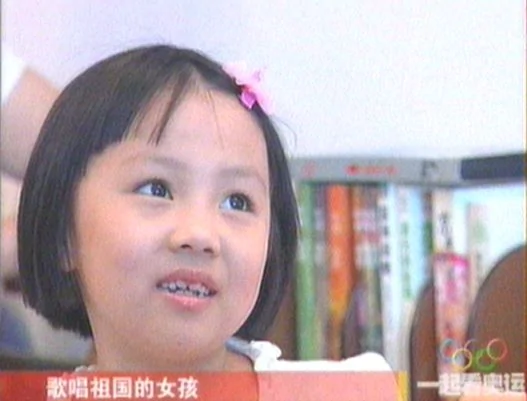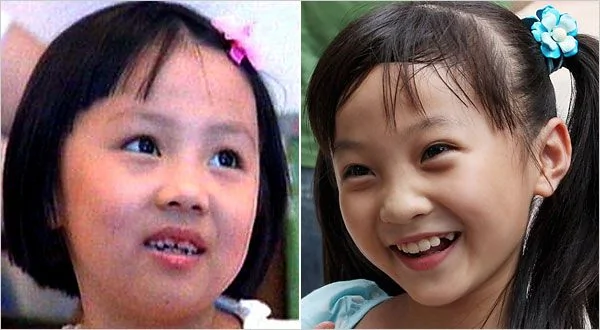
奥运开幕式《歌唱祖国》真正的演唱者 杨沛宜 小朋友。
杨沛宜尽管有甜美的歌声,但是她不能出现在奥运会开模式上.
大家都知道,配对口型的是有甜美外貌的林妙可小朋友。
2008北京奥运会开幕式音乐总监陈其钢说,这是“为了祖国的利益”。
我不懂,如果这杨小朋友出现在世人面前,祖国利益会受到损害吗?
是的,中国的形象是会受到损害,在这个连奥运会服务员的三围都有一定严格标准的国家里,在一个病态式地追求“美女”的国度里。
=============================================
2008北京奥运会开幕式音乐总监陈其钢告诉主持人,8月8日晚开幕式上那首《歌唱祖国》的声音原来并不是来自那位次日登上《纽约时报》的小红星林妙可–那个令亿万观众感动落泪欢呼不已的纯美声音的主人是一位7岁的小女孩杨沛宜。
至于这个“双簧”的原因,陈总监解释说,因为考虑到对外形象所以最后决定用外形更好一些的林小朋友…
新闻节目中,杨沛宜面对记者,演唱了一小段歌曲,一副童真的可爱模样,至少我个人认为她的长相是很可爱和讨人喜欢的,还不至于会因为长相问题被淘汰,况且,我一直认为,世上没有丑的孩子,“每个孩子都是上帝牵着手送到这个世界来的”。
当记者问她有没有觉得遗憾时,她回答说不遗憾,开幕式上有自己的声音已经很满足了…
看完新闻,我说不出话来…
林妙可
杨沛宜
这也算是个大爆料吧,为何在开幕式结束后的那场新闻发布会上,主创人员任何人都对代唱一事只字未提呢?张艺谋导演当时甚至特的向记者们隆重推出了一下林妙可,介绍了一下这个小姑娘的情况。我不免疑惑:当时张艺谋大导演似乎更应该把这位幕后的杨小朋友向广大观众推出一下,效果会比事隔几日后才由音乐总监陈其钢向观众道出真相好得多吧。如果陈总监没有讲出这段隐情,恐怕杨小朋友要远做一个藏在幕后不为人所知的声音了。
现在,已经有数不清的观众认定林小朋友才是真命天女,并且涌现出了越来越多的“可可粉”们,在这种情况下,幕后代唱事件的公布,对两位小朋友恐怕都不是什么好事。
网友对此议论纷纷,有人认为,以杨沛宜处在换牙期而由林妙可顶上的说法不靠谱,因为小孩子换牙是正常现象,还不至于“有损国体”;有人更逗,调侃说如果导演认为长相不好的歌手会有损国体,那么更应该给刘欢、韩红找帅哥美女出台顶替;甚至有些离谱的,直接发问:林妙可也被张艺谋潜规则了吗?
其实,如果把开幕式视为一场文艺演出,那么导演是有权决定如何安排和使用人力物力财力,只要演出的结果得到观众认可,那么演出就可以说是成功的。但是当这件事牵涉到两个分别只有9岁、7岁年纪的小孩子时,观众在得知真相后的愤愤不平可想而知。开幕式上更多打动观众的,是那个天真无邪的声音,为了导演心目中的“完美”而组合了导演认为最动听的声音和最美的面庞,那么,在全世界都在为这个美丽面庞喝彩叫好的时候,是否也该为那个动听的声音鼓一下掌,认可一下她的辛劳与付出?
再想想林小朋友在台上的演出,一个7岁的孩子能够把一幕并不简单的双簧演绎的几乎完美无缺,我不由的担忧:这孩子通过这次开幕式表演,会不会已经认为出众的长相可以给自己带来更多的机会和荣耀?
作为一个导演,对于完美的追求无可厚非,但悲哀的是,在得到了他自己想要的完美的同时,也毁了两个孩子本该纯净如水的童真。因为他的选择和淘汰相当于已经 给这两个孩子和他所面向的所有观众传达了这样的信息和理念:外表的美丽高于一切,因为只有外表是展示于人们眼前的,至于其他所有美好都只是外表的陪衬和修饰而已。
这种美的追求,恕我实在难以认可,尤其是对于孩子们,最美好的童年时光转瞬即逝,请在他们还不需要接触社会的红白灰黑与人情冷暖的年纪,把后一点纯真留给他们
-----------------------------------------------
附:网友评论:
中国人在"假"的环境中长大,所以对"假"已认为是常态...
刘欢的长相也不符合国家利益。
我党造假之风自亩产万斤到今仍不断发扬光大
张艺谋就是个大精神太监。溜须拍马炉火纯青。
在这个国家,作假已经是一种生活方式了。
××××××××××××
来源:纽约时报
Olympic Balladeer’s Voice Was Dubbed
Left, Agence France-Presse; Right, Zhou Liang/Xinhua
When Lin Miaoke, right, opened her mouth to sing "Ode to the Motherland" during the opening ceremony of the Beijing Olympics, the voice that was actually heard was a recording of seven-year-old Yang Peiyi, left.

BEIJING — Pigtailed and smiling, Lin Miaoke, age 9, stood in a red dress and white shoes during last Friday’s Olympic opening ceremonies and performed “Ode to the Motherland” in what would become one of the evening’s most indelible images: a lone child, fireworks blazing overhead, singing a patriotic ballad before an estimated one billion viewers.
Except that she was not really singing.
Her proud father, Lin Hui, who only learned of her singing role 15 minutes before the ceremonies began, watched on television and noticed “that the voice was a little different from hers.” On Tuesday, Mr. Lin said in a telephone interview that he had assumed “the difference might be caused by the acoustics.”
Acoustics had nothing to do with it. Under pressure from the highest levels of the ruling Communist Party to find the perfect face and voice, the ceremony’s production team concluded the only solution was to use two girls instead of one. Miaoke, a third grader, was judged cute and appealing but “not suitable” as a singer. Another girl, Yang Peiyi, 7, was judged the best singer but not as cute. So when Miaoke opened her mouth to sing, the voice that was actually heard was a recording of Peiyi.
And it is unclear if Miaoke even knew.
“The reason was for the national interest,” explained Chen Qigang, general music designer of the opening ceremonies, who revealed the deception during a Sunday radio interview. “The child on camera should be flawless in image, internal feeling and expression.”
China wants the Olympics as a stage to present a picture-perfect image to the outside world, and perfection was clearly the goal for the dazzling opening ceremonies. The filmmaker Zhang Yimou, who oversaw the production, has drawn international raves for a performance considered one of the most spectacular in Olympic history. But to achieve the spectacular, Mr. Zhang faked not only the song; organizers also have admitted that one early sequence of the stunning fireworks shown to television viewers was actually created using digitally enhanced computer graphics for “theatrical effect.”
Dubbing music during large outdoor performances is not unprecedented. At the 2006 Winter Olympics in Turin, the famed tenor Luciano Pavarotti, then 71, lip-synched an aria, a concession to his age and the cold weather. But the recording was still his voice, as is usually the case when performers lip-synch.
After last Friday’s performance, Mr. Zhang appeared at a news conference with Chinese reporters and praised Miaoke. “She’s very cute and sings quite well, too,” he said. Asked to name which section of the show he found most satisfying, he first mentioned Miaoke.
“I was moved every time we did a rehearsal on this, from the bottom of my heart,” he said, according to a transcript of the news conference.
Miaoke’s song was considered critical because it coincided with the arrival of the national flag inside the massive National Stadium, known as the Bird’s Nest. In his radio interview, Mr. Chen said that a member of the ruling Communist Party’s powerful Politburo, whom he did not identify, attended one of the last rehearsals, along with numerous other officials, and demanded that Miaoke’s voice “must change.”
By Tuesday, the Chinese media had already pounced on the story, instigating a national conversation that government censors were trying to mute by stripping away many, but not all, of the public comments posted online. The outrage was especially heated over the cold calculation used to appraise the girls.
“Please save the last bit of trueness in our children,” wrote one person using the online name Weirderhua. “They think Yang Peiyi’s smile is not cute enough? What we need is truth, not some fake loveliness! I hope the kids will not be hurt. This is not their fault.”
Another person added: “Children are innocent. Don’t contaminate their minds!”
Mr. Lin, Miaoke’s father, said his daughter had been under strict orders not to discuss plans for the performance. He got only the 15-minute notice about her role and was thrilled. He only later learned of the voice switch when he saw a video clip of the interview by the musical director, Mr. Chen.
In that interview on a program called “Beijing Music Radio,” Mr. Chen depicted the process of selecting a child singer as a tortured ordeal. He said about 10 children were chosen who “had a good image and who can sing well.” Initially, a 10-year-old girl was selected “whose voice was really good.” This girl held the role for most of the rehearsals — until Mr. Zhang decided she was too old.
Then, Mr. Chen said, the desired age of the singer was lowered and several young girls, including Miaoke and Peiyi, were taken to the Central People’s Radio Station in Beijing. “After the recording, we thought that Lin Miaoke’s voice was not very suitable,” Mr. Chen said. “Finally, we made the decision that the voice we would use was Yang Peiyi’s.”
But not her face. Photos posted online showed a happy girl with imperfect teeth, hardly an uncommon problem in China. “Everyone should understand this in this way,” Mr. Chen said. “This is in the national interest. It is the image of our national music, national culture, especially during the entrance of our national flag. This is an extremely important, extremely serious matter.”
He added, “I think it is fair to both Lin Miaoke and Yang Peiyi.”
On Monday, Peiyi appeared on China Central Television, or CCTV, the state network. “I’m O.K. with it,” she told her interviewer, even performing a song. “My voice was used in the performance. I think that’s enough.”
Miaoke’s father, a news photographer at a Chinese newspaper, was worried about how she would take the news. Since age 6, Miaoke has worked in television advertisements, even appearing with the country’s wildly popular hurdling champion, Liu Xiang. Her appearance in the opening ceremonies made her an instant celebrity in China, and her image was reproduced around the world.
“Here’s something I want to tell you,” Mr. Lin said he told his daughter. “The music director announced just now that it was not your voice when you were singing at the opening ceremony. The song was actually performed by you two girls.”
Mr. Lin said his daughter was not upset. He said that Miaoke and Peiyi were “good friends” and that Miaoke “doesn’t care who sang the song, as long as she performed.”
Then, he added: “I don’t care about this, either. The only thing I care about is that my daughter will not get hurt by this. She’ll understand when she grows up.”
Correction
A Getty Images picture that appeared earlier with this article and on the home page was published in error. The girl shown was an unidentified performer in the opening ceremony at the Olympics; it was not Lin Miaoke, a nine-year-old who also performed.



















